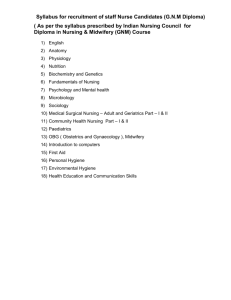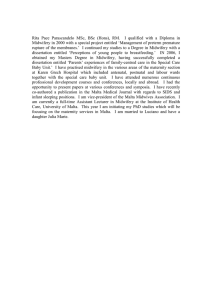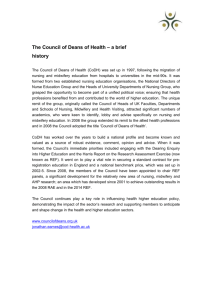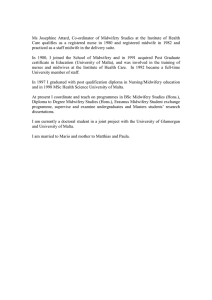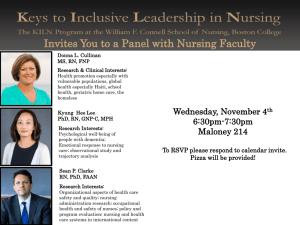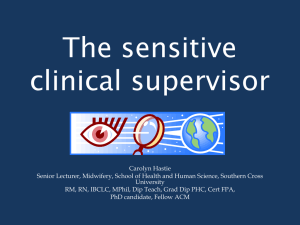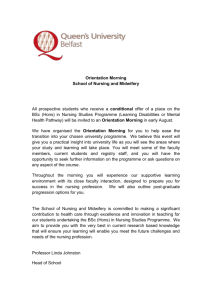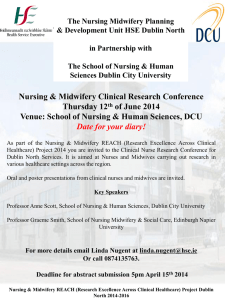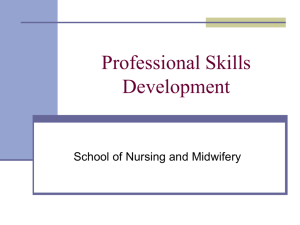FHS Monthly Newsletter – December 2010 PAST EVENTS
advertisement
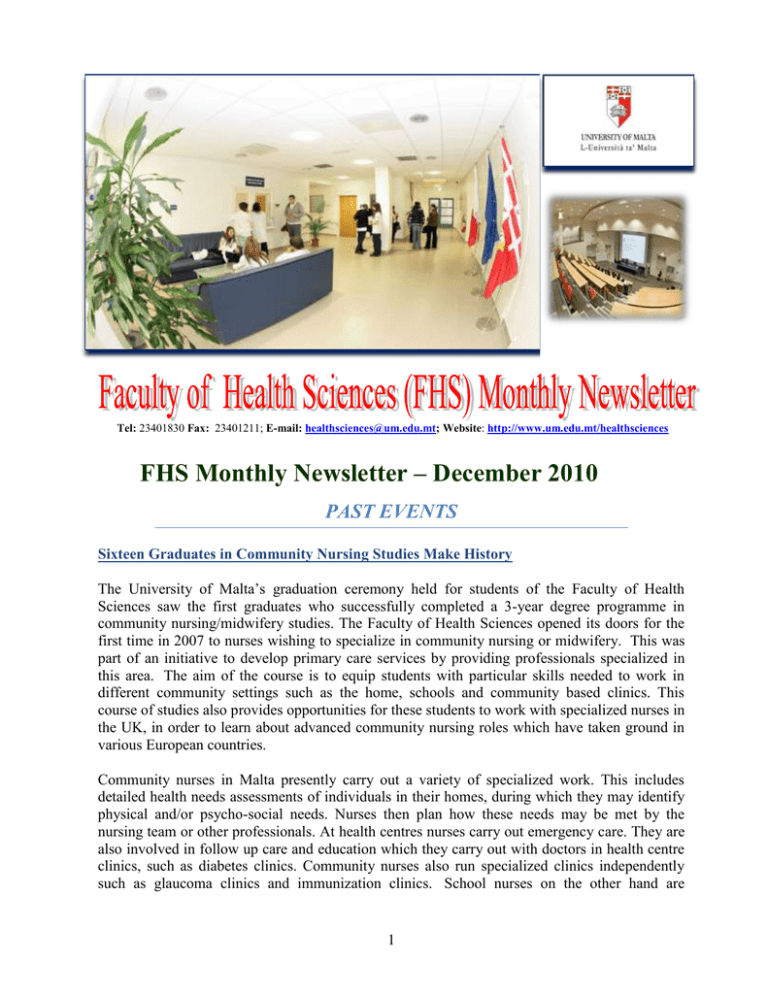
Tel: 23401830 Fax: 23401211; E-mail: healthsciences@um.edu.mt; Website: http://www.um.edu.mt/healthsciences FHS Monthly Newsletter – December 2010 PAST EVENTS Sixteen Graduates in Community Nursing Studies Make History The University of Malta’s graduation ceremony held for students of the Faculty of Health Sciences saw the first graduates who successfully completed a 3-year degree programme in community nursing/midwifery studies. The Faculty of Health Sciences opened its doors for the first time in 2007 to nurses wishing to specialize in community nursing or midwifery. This was part of an initiative to develop primary care services by providing professionals specialized in this area. The aim of the course is to equip students with particular skills needed to work in different community settings such as the home, schools and community based clinics. This course of studies also provides opportunities for these students to work with specialized nurses in the UK, in order to learn about advanced community nursing roles which have taken ground in various European countries. Community nurses in Malta presently carry out a variety of specialized work. This includes detailed health needs assessments of individuals in their homes, during which they may identify physical and/or psycho-social needs. Nurses then plan how these needs may be met by the nursing team or other professionals. At health centres nurses carry out emergency care. They are also involved in follow up care and education which they carry out with doctors in health centre clinics, such as diabetes clinics. Community nurses also run specialized clinics independently such as glaucoma clinics and immunization clinics. School nurses on the other hand are 1 involved in developmental screening and health surveillance of school children, while community midwives carry out post natal home visits. The Faculty of Health Science is currently running another degree programme in community nursing care and plans to continue providing this opportunity for study in the future. Graduand`s address at the 2010 Graduation Ceremony by Dr Daniela Gatt, Communication Therapy Department (24 Nov 10) Dr Daniela Gatt delivered the graduand’s address at the ceremony marking the conferment of Masters and PhD degrees on students from the Faculty of Health Sciences. Dr Gatt considered current evidence on early language development in young Maltese children, drawing on findings from her PhD thesis. She addressed the imminent need for further scientific enquiry in the field, highlighting the theoretical and clinical implications that may be derived from research evidence on young children’s emergent language skills. Given the distinctive language-learning context to which young Maltese children are exposed, documentation of early language development may contribute objectively towards language policy planning and implementation. In addition, further investigation of early language development would facilitate the early identification of language disorders in Maltese children, thus minimising the long-term consequences of such impairments. ePsychNurse.Net Project ( Nov 10) At the end of November 2010 Mr Martin Ward, from the Mental Health Nursing Team at the Faculty of Health Sciences, attended the first project consortium meeting of phase two of the EU funded ePsychNurse.Net Project at Turku University, Finland. The eight national partners are Finland, Italy, Lithuania, Portugal, UK, Switzerland, Germany and the Netherlands with the inclusion of the European Psychiatric Nursing Association, Horatio acting as the project disseminators. The aim of the project is to deliver a pre-piloted (undertaken in phase one) on-line study unit or 5ECTS (125 hours) which explores acute care of mentally ill patients within in-patient settings. It is currently in five languages but will be translated to an additional three for this phase. Each targeted group of students will have the dedicated support of an on-line teacher and the pilot programme of 200 nurses showed where phase two supervision has to be modified. The course is open to all professionals working in mental health care and particularly favours geographical areas and disadvantaged professional groups who would not normally have access to either educational programmes or e-learning opportunities. The project promotes the use of the European Quality Assurance Reference Framework for VET (EQARF) by developing QA eSystems and integrating this as part of the continuing education cooperation between the participating organizations. During the project, protocols for up-dating the e-course will be developed. This will ensure continuing development, implementation and evaluation of the ecourse in future. The project will conclude in October 2012 with all milestones and work stages identified for its duration. 2 Although Malta is not yet one of the 12 sites which have elected to take the course, which will be on-line from October 2011, it is hoped that local mental health providers will opt in, thus offering CPD to members of staff who are not normally included in such initiatives. Martin’s involvement in the project is part of the Horatio team with responsibility for disseminating material throughout Europe A Midwifery Symposium organised by Midwifery Department (25 Nov 10) Students addressing the Symposium A Midwifery Symposium was held on Thursday, 25 November 2010, at the Central Auditorium, Mater Dei Hospital. Students, their parents, midwives and lecturers were invited to participate in the symposium. This cohort was the first midwifery students who graduated under the newly established Department of Midwifery, Faculty of Health Sciences. Five students gave a presentation of their dissertation while another two students presented a poster on their studies. The Organizzazjoni, Studenti Qwiebel, OSQ also presented a poster about their activities. Each presentation highlighted how midwifery as a profession is evolving with regard to the social model of midwifery and the multicultural society that we are living in today. One paper focused on fathers’ influence on breastfeeding. Another presentation was on the knowledge of midwives in caring for circumcised women during labour, given that Malta is fast becoming a multicultural society. The next presentation referred to midwives’ views and knowledge on babies’ sleeping practices on the postnatal ward. Another interesting presentation was on pregnant women’s awareness on folic acid supplementation while the last focused on assessing and managing pain in the preterm in a neonatal intensive care unit setting. All these diverse presentations and posters showed that midwives can create a better future not only for midwifery education and practice, but also for their clients, that is, the mother, the father, the child and the family, which is the cornerstone of our society. 3 Seminar – Caring for the Unborn Child - 10th December, 2010 A seminar entitled ‘Caring for the unborn child’ was organised by the Movement of the unborn child, the Swedish Embassy in collaboration with the Department of Midwifery, Faculty of Health Sciences, University of Malta, was held at the Main Auditorium, Mater Dei Hospital on the 10th December 2010. Over 120 students, health professionals and the general public attended the seminar. The main speaker was Ms Eva-Karin Enwall, the project Director, Swedish National Institute. She focused her first presentation on the effects of alcohol use. She pointed to studies which suggested that even with moderate drinking the risk of cancer increased by 20%, while cardiovascular diseases, depression and liver cirrhosis were also linked to high alcohol consumption. Ms Enwall spoke about the wide-spread use of alcohol in Sweden and the launch of an education project in Sweden about alcohol prevention for primary health care and occupational health care professionals. The main aim of the project is to train health professionals to support and motivate individuals to a change in lifestyle with regard to alcohol consumption. Ms Enwall pointed out that 99.9% pregnant women have regular contact with the midwife during pregnancy at the antenatal midwifery clinics. Swedish research is showing that while in 2003, 30% of women consumed alcohol during pregnancy; this went down to 10% in 2006. In 2008, 8% of women consumed alcohol during pregnancy. This suggests that the number of women misusing alcohol during pregnancy has progressively diminished since the project was launched in 2004. Dr R. Borg Xuereb in her closing address said that caring for the unborn child gives hope to the future of society as the fertility rate at present is 1.4, which is far below replacement levels of 2.1. She pointed to research, which suggested that maternal stress or anxiety during pregnancy is associated with an increased risk of disturbance of the unborn child`s neurodevelopment and behaviour. In her local study of 221 randomly chosen couples, 192 women were in employment during pregnancy. Overseas research is indicating that high levels of job stress during pregnancy is also associated with reduced birth weight and an increased risk of a small for-gestational-age infant, particularly, if mothers work 32 or more hours per week. Psychological support during pregnancy could reduce the incidence of emotional and cognitive challenges later in the child, however further research was needed to explore the efficacy of such interventions. Dr Borg Xuereb concluded that midwives have a responsibility for providing the best evidence based care and information on the creating of a better future for the mother, her partner and the unborn child. 4 NEW RECRUITS Ms Paulann Spiteri is a staff nurse by background, and until recently, a Team Leader of a multidisciplinary psychiatric Outreach Team at Mount Carmel Hospital. She joined the Mental Health setting six years ago and is particularly interested in Community Mental Health services. In 2006, she enrolled on a Master’s degree in nursing and this helped to further her growing interest in teaching. After completing this degree, she had the opportunity of becoming a part-timer and eventually a full-timer within the academic setting. She is now part of the Mental Health Team within the Department of Nursing and is finally pursuing her wish of following a doctoral program. Paulann lives at Bugibba and enjoys a variety of activities such as reading, writing, socialising, and listening to music. Dr. Michael Galea received his doctorate in Psychology in 2003 from the Loyola University Maryland, USA. Before that, Michael graduated at the University of London (M.Th.) in 1996 in Pastoral Theology. Later, he graduated from the Loyola University of Maryland (M.Sc.) in 2000 in Pastoral Psychology, with an intensive supervisory experience. He is certified by the U.S. National Board for Certified Counsellors, Inc. (NBCC), and is a licensed psychologist (APA - MD). Between 1999 and 2003 Michael worked at Taylor Manor Psychiatric Hospital in Maryland, USA, and provided supervised psychological services at Lighthouse Inc. (for families and children after trauma), and at Frederick Ozanam Shelter for the Homeless, both in Baltimore, MD, United States of America. Michael has also worked in Kenya, East Africa, London, UK, and in Ventnor City, NJ, USA. A deep, albeit short encounter, was his counselling experience to some refugees fleeing the Rwandan Genocide in 1994 into Kenya. Michael has worked with the Education Department from 2004 until recently. Moreover, he has been a visiting lecturer at the University of Malta with the Faculty of Arts and Faculty of Education, covering psychology-related modules, and adult education. Dr. Galea has also given psychological services to Kana Movement, Sedqa (addiction counselling), Appogg agency (at CCF), and to M.E.G. movement, for needy causes. His doctoral research focused on the reality of child abuse in Malta, a study done among university students, in which around 11% of participants qualified as severely abused on the key domains of childhood maltreatment. He has participated in various conferences in Malta, including Anger Management Skills (Victoria – 2003), The Enneagram: knowing yourself (Mellieha - 2003), Youth Leadership Skills (Victoria – 2004), Healing the Healers: Nurses’ National Conference (Qawra – 2007). In 2009, he conducted Competence Based Learning as part of the Gozo College secondary school development plan. During the same year, he also 5 participated in the Experiential Learning Conference in Bergamo, Italy. He contributes regularly to the mass media, including local print, radio and television programs. Dr. Galea is a certified Clinical Psychologist and Family Therapist. He lectures at the Faculty of Health Science, University of Malta. RESEARCH, PUBLICATIONS & PRESENTATIONS Clinical Assessment of Ankle Joint Dorsiflexion: A Review of Measurement Techniques - paper prepared by Mr Alfred Gatt, FHS Podiatry Department, which will be published in the Journal of the American Podiatric Medical Association in the January/February 2011 issue. Abstract: Ankle dorsiflexion measurement is important for clinical and research use. With so much evidence on the unreliability of goniometric measurements, a systematic review was performed to investigate various alternative techniques of measuring ankle dorsiflexion in the non-neurological patient. All major databases were queried electronically in order to identify studies that utilized any method of ankle dorsiflexion measurement in the non-neurological subject. Keywords included ankle dorsiflexion NOT cerebral palsy NOT stroke, the latter to exclude neurological conditions. Out of 755 studies that utilized some form of ankle joint dorsiflexion measurement, 10 different techniques were identified, which included various apparatus designed specifically for this purpose. Reliability testing of these techniques involved test-retest trials with small student populations as subjects, which returned high ICC scores. However, their methodological quality would have benefitted from the use of an actual patient population and the comparison to a reference standard. When validating ankle dorsiflexion measurement techniques, actual patient populations should be used, otherwise papers would score poorly on methodological quality assessment. Standardizing patient position, foot posture, amount of moment applied and reference landmarks ensure that various trial results can be compared directly. (J Am Podiatr Med Assoc 101 (1), 2011) FORTHCOMING EVENTS Reminder - Research Seminars for Faculty lecturing staff and students undertaking a doctoral degree Please find an updated schedule of the Research Seminar to be held in the Staff room between 1 and 2 pm. 6 No Date Presenter Study Department 1 12th Jan 2011 Dr Michelle Camilleri PhD Nursing 2 26th Jan 2011 Mr Frank Zarb Radiography 3 2nd Feb 2011 Dr Daniela Gatt PhD (in progress) PhD 4 9th Feb 2011 Dr Roberta Sammut PhD Nursing 5 23rd Feb 2011 Dr Cynthia Formosa PhD Podiatry 6 9th Mar 2011 Dr Anna McElhatton PhD Food Stud. & Env. Health 7 23rd Mar 2011 Mr Tonio Agius Physiotherapy 8 6th Apr 2011 Ms Josephine Attard 9 4th May 2011 10 18th May 2011 Ms Claire Sillato Copperstone Mr Anthony Scerri PhD (in progress) PhD (in progress) PhD (in progress) MSc Communication Therapy Midwifery Food Stud. & Env. Health Nursing/ Health Services Mgt Rosienne and Joseph gave excellent presentations on the 1st and 15th December, 2010 respectively. Talks by FHS Academic Staff at Junior College, Msida – 19 & 26 January 2011 The Faculty of Health Sciences has been invited by the Counselling Service Department of the Junior College, Msida to give presentation to the college students on the 19th and 26th January, 2011 between 14:00 and 15:00. The above is being coordinated by Ms Pauline Bartolo, BA (Hon), Dip.Sch. Counselling, MA Educ (Guidance Studies) (Derby). FHS Staff taking part: Dr Cynthia Formosa, Podiatry Dr Anna Mc Elhatton, Food Studies and Environmental Health Ms Joanna Bellia, Occupational Therapy Dr Daniela Gatt, Communication Therapy Dr Josianne Scerri , Mental Health Dr Michelle Camilleri, Nursing Mr Gerbert Van Dijk, Radiography Ms Sue Mercieca, Radiography 7 Medical Databases Training Workshops : 27-28 Jan 2011 The University Library Services will be organising two training workshops for the academics at the Faculty of Health Sciences that will cover the use of the library`s subscribed online medical databases. The venue of the workshops will be at the Faculty of Health Sciences I.T. Lab and will be held on the following days: Thursday, 27 January, 2011 from 15:00 to 16:00 hours Friday, 28 January, 2011 from 15:00 to 16:00 hours Those of you who would like to participate are kindly requested to send an email asap to Mr Silvio Cortis (silvio.cortis@um.edu.mt), Head of Reader Services, University Library Services, by not later than Friday, 7th January, 2011. ANNOUNCEMENTS Forthcoming Faculty Board Meeting: 20th January, 2011 Booking of Premises, Labs, Quotations and Invoicing at FHS – Contact persons Board Room: Ms Moira Spiteri, Tel: 23401908 Auditorium, Seminar and Lecture rooms: Ms Joanne Xuereb Tel: 23401835 Quotations and Invoicing: Mr Patrick Chircop Tel: 23401572 Laboratories: Mr Joe Mark Gatt, Tel: 23401856/23401202 IT Services @FHS All staff members at IHC are kindly reminded to use the email address below for all their IT support requests. Requests should include a brief description of the IT problem, contact details and time/s when the staff member is available so that one of the IT Officers will contact him/her. All requests sent on the below email address are automatically logged on a computerized system and assigned a ticket number. This service is fully supported by the University IT Services team. IT Officers at FHS can be contacted as follows: E-mail: support.itservices@um.edu.mt; Tel: 2340 1884. 8 Planned Preventative Maintenance for Laboratory Equipment Equipment`s reliability is sometimes taken for granted, in certain circumstances we use equipment until it breaks down after which we choose to, either repair or replace it. This approach cannot be used when the equipment is being relied upon to provide accuracy, safety or treatment. It is for this reason that Mr Joseph-Mark Gatt, Lab Officer, FHS (Tel: 23401856) is going to meet with the Heads of Department, to discuss which medical equipment qualify to be inserted into a planned preventive maintenance scheme. At present Joe Mark is in the process of gathering details regarding all the laboratory equipment. This data will not only be used to formulate reports for the above-mentioned maintenance scheme but also to catalogue any upgrades or repairs required. It is hoped that by introducing this maintenance scheme, equipment reliability, will be increased where it is most needed. 9
